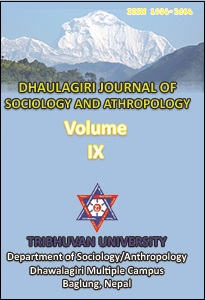Equity, Inclusion and Conflict in Community Based Forest Management: A Case of Salghari Community Forest in Nepal
DOI:
https://doi.org/10.3126/dsaj.v9i0.14029Keywords:
Community forestry, dalits, non-dalits, internal conflictAbstract
The equity and inclusion issues are widely observed in Community Based Forest Management (CBFM) and Community Forestry (CF) is not an exception. Community Forest User Groups (CFUGs) are portrayed as robust grassroots institutions for forest management and group governance. However, many contemporary researches have shown that CFUGs are still governed by some influential local elites who hardly practice equity and inclusion. In this context, objectives of this paper are: to explore how equity and inclusion issues lead CFUGs fall into internal conflicts; and to demonstrate how CFUGs are able to address such issues locally. The study was carried out in Salghari CFUG of Ratnechaur, Myagdi. Semi-structured interview and focused group discussion were key tools used for data collection. Livelihoods and Social Inclusion Framework and Equity Framework are used for data analysis. The findings of the research revealed that dalits and non-dalits of Salghari fall into internal conflict regarding the use of forest products. The conflict was then managed through amendments in CF provisions and change in CF leadership. This paper concludes that execution of equity and inclusion provisions in CF, secures access to assets for disadvantaged people from CBFM. However, this demands empowerment of these people and facilitating role of external agency.Downloads
Download data is not yet available.
Abstract
1556
PDF
1972
Downloads
Published
2015-12-07
How to Cite
Acharya, S., & Upreti, B. R. (2015). Equity, Inclusion and Conflict in Community Based Forest Management: A Case of Salghari Community Forest in Nepal. Dhaulagiri Journal of Sociology and Anthropology, 9, 209–223. https://doi.org/10.3126/dsaj.v9i0.14029
Issue
Section
Articles




